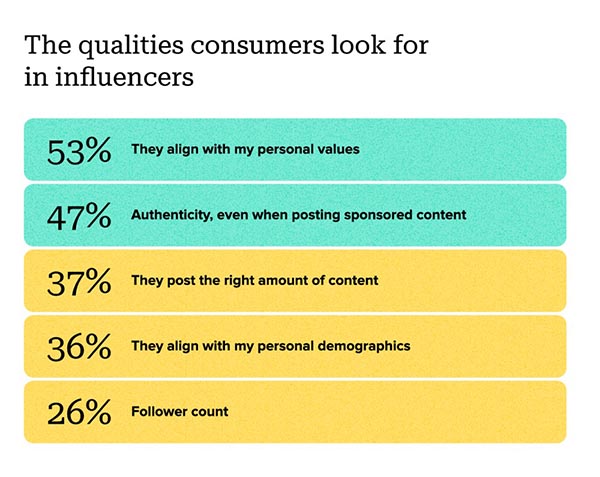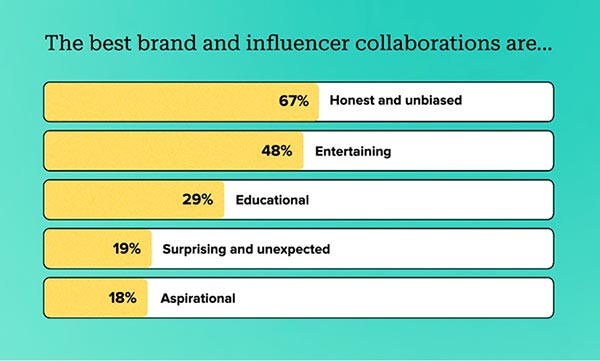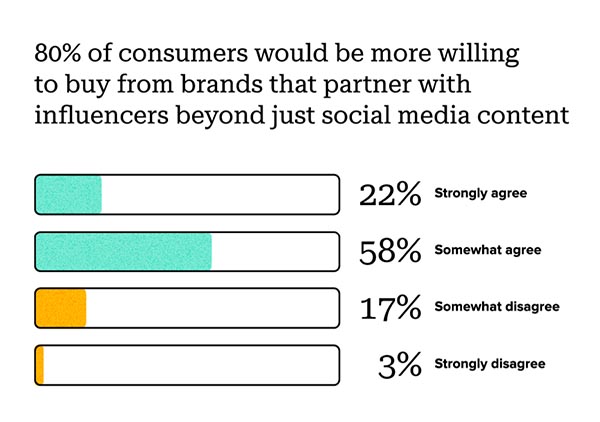If you are a marketer, you likely have either a love or hate relationship with influencer marketing.
According to Sprout Social, 49% of consumers make purchases at least once per month because of influencer posts, and 30% trust influencers more than they did six months ago. It’s no wonder that, according to a similar report from Influencer Marketing Hub, 67% of marketers plan to increase their influencer marketing budgets this coming year.
But influencer marketing isn’t simple and straightforward. To be effective, you need to find the right match between your products, the chosen influencers, and the needs and habits and preferences of your target audience.
It’s no wonder that 32% of Influencer Marketing Hub (IMH) respondents find influencer marketing ineffective. Finding the right mix is hard work, and you don’t get the benefits if you don’t get it right. Indeed, the task might be super-human. Perhaps this is why IMH found that 63% of marketers surveyed plan to use AI in executing their influencer campaigns, and 55% of these will use AI for influencer identification.
- Different demographics want different things.
According to Sprout Social’s 2024 Influencer Marketing Report, different demographics want different things from their influencers. While 53% of respondents overall said they prefer influencers who algin with their personal values, just under half (47%) want authenticity. This desire for authenticity isn’t the case with all demographics. In fact, among Gen Zs, this drops to 35%. Far more Gen Zs (47%) care about follower count.
Notes Melo Meacher-Jones, head of social and influencer at Accenture Song, as quoted in the Sprout Social report: “Authenticity is overrated. We [as consumers] follow influencers not because we believe in their authenticity but because they entertain or interest us. It's a mutually beneficial relationship.”
Ben dan Gahan, co-founder and CEO of Creator Authority, adds, “Marketers have long parroted authenticity as the cornerstone of influencer success. Clearly most have not bothered to ask fans if they feel like that’s the case.”

Surprising? It shouldn’t be. We know reality TV shows aren’t authentic, yet we love them for their entertainment value. Why should other types of influencers be any different?
Younger generations, in particular, have grown up with social media, so they have no illusions about how marketers are using it. “Millennials and Gen Z consumers are the most trusting [of social media]—in part because they grew up with influencers marketing on social and know they’re being sold to (and they’re okay with it),” the report notes. “For [these buyers], influencer marketing is the norm.”
What are the top qualities of influencers that sway consumers to buy?
- 64% genuine reviews
- 55% discount codes
- 26% seeing multiple influencers post about the same product.
- What Makes a Winning Partnership?
Across ages and genders, honest and unbiased influencer content “stops consumers mid-scroll,” according to Sprout Social, while aspirational content is least likely to catch their attention. Consumers also want to be entertained rather than be educated or surprised.

One notable impact of influencer marketing is the change in dynamic between the brand itself and its customers. Gen Z and frequent buyers are the most likely to share product feedback with influencers rather than with the brands themselves. “In the future, care teams and marketers will have to work more closely with influencers to ensure they capture and address these valuable customers insights,” notes the report.
Of course, not all influencers will want to work with all brands. If you think adding influencer marketing will revive your floundering social media marketing program, you’d be wrong. Most influencers (93%), the quality of a brands’ existing social content impacts whether they agree to collaborate. They want to work with brands that make them look good, too.
Other factors impacting an influencers’ willingness to work with a brand? More than one-third (63%) want to work with brands that share their values and 59% want to work with companies that have clear budgets and payment structures.

- Which social media platforms are most influential?
The top platforms for influencers are those with the most visual, storytelling capacity: Instagram, Facebook, TikTok, and YouTube.
As we would expect, consumer platform preferences vary by age. Half (50%) of Baby Boomers are most likely to engage on Facebook, while Gen X and Millennials are almost twice as likely as Boomers to engage on Instagram. Over one-quarter (27%) of Gen Zs engage with influencers on TikTok, compared to 15% overall.
Because the choice of influencer is so personal, this is why it’s so important for influencer marketing to be data driven.
Let the Data Be Your Guide
In conclusion, the key to successful influencer marketing is as follows:
- Challenge your assumptions and let data be your guide.
- Make sure you are choosing the right influencers to match the demographics of your audience. Ensure that not only do the influencers match, but you are choosing influencers on the right channels for your audiences’ preferences.
- Don’t pressure influencers to provide glowing reviews. An influencers’ followers can sniff out a biased review. They know their influencers’ personalities, tendencies, and preferences. If an influencer suddenly starts pushing product and it doesn’t the sniff test, their followers will get turned off immediately.
- Engage influencers beyond social media. Sprout Social found that 80% of consumers would be more likely to buy from brands that partners with influencers beyond social media content.
Want to learn more? Download the report here.














